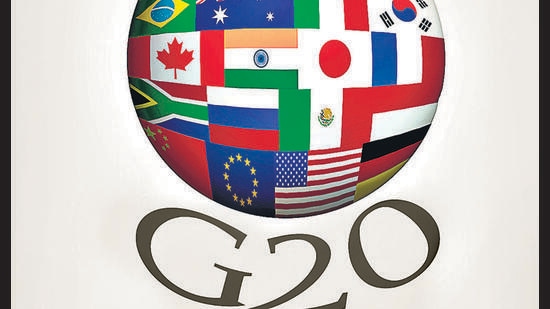Four challenges that await India at G20
India takes over as the president of the group in December. It must set the ball rolling to reform the G20, set new limits on economic warfare, reshape the global green agenda and prevent debt-related crises
In the autumn of 2008, as the global financial system tottered on the brink of collapse, leaders from the world’s largest economies came together in Washington DC to chart a global rescue plan. This was the first leader-level summit of the G20, and it helped avert a global economic depression.

The initial success of the G20 raised hopes that it would become a key decision-making forum, providing emerging markets a platform to shape new norms of global governance. Fourteen years down the line, such hopes have dimmed. Today, the G20 faces an existential crisis even as the G7 regains its lost clout.
India, which takes over the G20 presidency in December, has a chance to breathe new life into the moribund group. Whether it succeeds will depend on how well it tackles four key challenges.
The first challenge is to reform G20. The group needs to be far more cohesive than it is today. It also needs to be a bit more representative. One proposal put forward by the British economist Robert Wade many years ago was to have the membership capped at 15, with a mix of permanent and temporary members. A smaller set of members would allow leaders to gel better, and have a sense of ownership, he argued. Rotating membership would throw open the doors of the group to a much wider set of countries.
In such a system, the 10 largest economies could be automatic and permanent invitees. The rest could apply for a five-year term. The selection of temporary members should ideally be based on transparent criteria such as economic size or population. Converting G20 into a potentially more effective G15 will ensure that the “idea of G20” survives even if G20 itself dies a natural death.
The second challenge is to set new limits on economic warfare. Just as the Geneva Conventions established international legal standards for treating non-combatants and the deployment of bio-chemical weapons, we need similar restrictions today to check the ever-growing use of economic sanctions. The Western sanctions on Russia show that such sanctions often fail to deter aggressor states but can inflict heavy costs on civilians.
The growing use of sanctions by the “great powers” in the early 20th century played a key role in causing the Second World War, Cornell University historian Nicholas Mulder argues persuasively in his new book, The Economic Weapon: The Rise of Sanctions as a Tool of Modern War.
As the world braces for a great power conflict once again, it is important to deliberate on this issue. Since the G20 includes all the world’s bullies, it is the right forum to discuss the rules that should govern the use of economic weapons henceforth.
The third challenge is to reshape the global green agenda. It is in India’s and the world’s interest to ensure that the transition to a greener future does not impoverish the already impoverished parts of the world.
The current climate crisis is largely a result of the myopic policies of the Global North. Yet, the consequences of the crisis are higher in the Global South. India must keep highlighting this contradiction, and find constructive solutions to finance the transition needs of developing countries.
The renowned economist Partha Dasgupta has suggested that we need a global institution to manage the planet’s natural assets. Dasgupta argues that such a body could levy charges on cross-country freight, and pay Latin American countries such as Brazil to preserve the Amazon rainforest. The G20 could help set up such an institution.
The fourth challenge relates to sovereign debt. A series of debt crises in the developing world, including in India’s neighbourhood, doesn’t bode well for global financial stability.
The G20 had agreed on a debt recast plan for indebted countries in the immediate aftermath of the pandemic. This is one area where the dysfunctional group showed some initiative. It is time to expand the scale and scope of that initiative to prevent further debt-related crises.
The G20 failed to reform global financial institutions such as the World Bank and the International Monetary Fund (IMF). But it can nudge these lenders to deal with the debt problems of the developing world more sensitively. The usual conditions in IMF debt restructuring programmes should be eased till the world has recovered from the twin shocks of the global pandemic and the Russia-Ukraine war.
India can play the role of a catalyst in finding credible solutions to all of these issues. As a large fast-growing democracy from the developing world, India’s stance carries weight. India also has a rich legacy on the global stage as a founder of the non-alignment movement and the G77 trade grouping. India’s current positioning as a voice of the Global South is not entirely new.
The impact of India’s interventions will depend, to a great extent, on its preparedness on key issues. The G20 presidency offers Indian policymakers an opportunity to highlight innovative solutions to some of the world’s trickiest challenges. But the world will take such proposals seriously only if they are backed with rigorous analysis. The halo of the presidency won’t be enough.
Pramit Bhattacharya is a Chennai-based journalist The views expressed are personal
Continue reading with HT Premium Subscription




